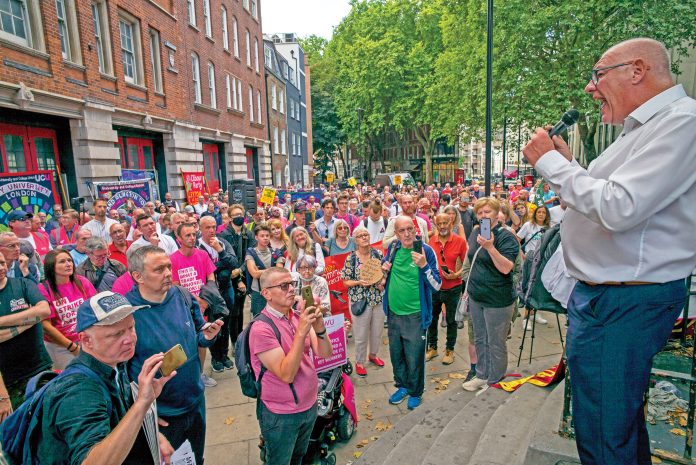Stephen Brown, Oxford Socialist Party
2022 may go down as the year the penny dropped. Millions are beginning to understand how much of our economy has operated as a kind of scam for many years.
As the RMT representatives keep saying, there isn’t a shortage of money. There is plenty of money around. Since 2008 the government has spent nearly a trillion pounds bailing out the banks. Where did that money go? It certainly didn’t trickle down. The opposite happened. It went into assets, stocks, shares, property. The stock market grew, the rich got richer, prices and rent went up.
During Covid the government splashed out £450 billion. Where did that go? That’s £10,000 for every adult in Britain. And as the economist Gary Stephenson says, if your bank account isn’t £10,000 better off than before Covid, someone else has got your £10,000. Who could that be? Well, the wealth of the richest 250 people in Britain grew by 22% in the first year of Covid alone. In that time, the typical billionaire made, wait for it… £600 million.
And whether it’s the railway companies, the telecommunication companies or the supermarkets, they are all still raking in huge profits. Railway companies made over £500 million even during the worst of Covid, Sainsbury’s this year made over £600 million.
Greed crisis
It is not wages that are driving up inflation. As trade unionists are saying, it is profits. Wages, especially in the public sector, haven’t really increased in recent years and inflation is going through the roof. But wage increases can mitigate some of the worst effects of the cost-of-living crisis for workers. As someone said at the TUC rally on 18 June, it’s really a wage crisis. Or, more accurately, a greed crisis.
When prices and profits rise, and wages stagnate, workers are being impoverished. It is an attack on workers, their families and living standards.
And as if to illustrate this, there are now more food banks in Britain than McDonald’s outlets. Companies such as BT are even incorporating food banks into their premises or, as they call them, a ‘food pantry’.
Even before the pandemic, there were 2.5 million people in Britain living in destitution. This included over half a million children. That is set to rise massively over the next 12 months.
So, if one of the major factors contributing to the cost-of-living crisis is that the richest have been given huge amounts of money in recent years, part of the solution has to be to take a huge amount of money away from the richest in society and give it to the workers.
The leaders of the RMT and other unions have helped to raise awareness among the general public around the need for industrial action and to improve understanding of the bigger picture that has seen this huge transfer of wealth to the richest in our society in recent years.
Now the unions must begin to organise politically, to form a union-led, mass workers’ party to fight for nationalisation, reversing cuts, a decent living wage for all and a socialist alternative to capitalism.







